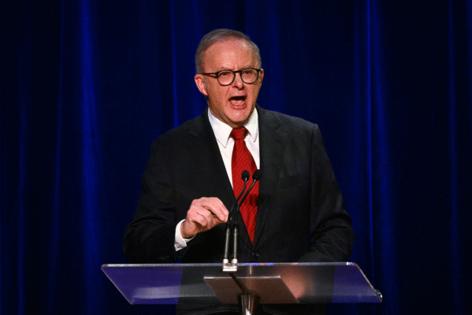Trump backlash helps Australia's leader to historic reelection
Published in Political News
For the second time in a week, voters in a prominent U.S. ally angered by President Donald Trump punished conservatives and reelected a left-leaning incumbent.
Australian Prime Minister Anthony Albanese was poised to win the largest victory for his center-left Labor Party since 1946, both in terms of two-party preferred and overall seat count. He’s the first Australian leader to win consecutive elections in more than two decades, and the only one to increase his party’s vote share after one term since World War II.
“We do not need to beg, or borrow, or copy from anywhere else,” Albanese said in his victory speech on Saturday night. “We do not seek our inspiration overseas. We find it right here, in our values and in our people.”
Similar to Canada’s election last week, the outcome in Australia would’ve been hard to predict just months earlier. Both ruling parties were on the ropes, with conservatives in both countries seeking to capitalize on the momentum of Trump’s solid election win in November.
Yet stunning turnarounds over the past few months led to big election wins for incumbents in both countries. Those results are set to reverberate across the world, as governments from Asia to Europe to Latin America grapple with how much to stand up against Trump’s tariffs and other threats.
It particularly poses a dilemma for conservatives, who must decide whether to embrace Trump or run from him. While Nigel Farage’s Reform UK is riding a wave of support, suggesting that Trump-style populism is still attractive in some places, conservatives in Australia were feeling wounded after the election loss.
“It would be dangerous for my party, and I speak as Ronald Reagan Republican and a George Bush Republican, speaking to Donald Trump’s positions,” James McGrath, a senator from Dutton’s Liberal Party, said on Australia’s ABC network on Saturday night.
“We are a free-trade party and pro-Ukraine and we should continue to be centre-right,” he added. “We must resist that path.”
Trump loomed over Australia’s campaign, with his decision to impose 10% “reciprocal” tariffs in early April coming just as the nation’s major political parties began canvassing for votes.
Albanese’s party persistently accused opposition leader Peter Dutton of copying Trump’s policies, prompting him to distance himself from the U.S. president in recent weeks. On Saturday night, Dutton followed Canadian conservative leader Pierre Poilievre out the door, losing his seat of Dickson to Labor.
‘Big thinker’
Dutton made the mistake of trying to paint himself as closer to Trump in the early stages of the campaign. He complimented the U.S. president as “shrewd” and a “big thinker,” while promoting Trump-like policies such as cutting the size of government, return to work for federal employees and ending progressive social policies.
Dutton’s choice of MAGA-style policies, a broader pushback against conservatives and a swing toward stability by voters were all evidence of how Trump influenced Australia’s election, according to Steven Hamilton, assistant professor of economics at George Washington University.
“Without the Trump factor, I think Labor still would’ve got a majority, but I think Trump contributed to the vast margin that Albanese has secured,” Hamilton said. “It made things worse.”
Trump was deeply unpopular in Australia even before he placed broad tariffs on the nation’s exports. A poll by Redbridge in March found that 59% of voters surveyed had an unfavorable view of the U.S. president.
But it wasn’t simply comparisons between Trump and Dutton that prompted voters to embrace Albanese for a second term.
For Australians, chaotic international events often spark a swing back toward incumbents, including in the wake of the terrorist attacks on Sept. 11, 2001. This time around, voters were unnerved by unsettling swings in global markets in the wake of Trump’s tariff announcements.
Trade uncertainty
One major question now is whether the solid win will change the way Albanese deals with Trump. The Australian leader who came from public housing faces a tightrope in dealing with a U.S. president who embraces opulence: While his citizens don’t like Trump, they also want to maintain the U.S. security alliance.
When it comes to trade, Albanese now has a stronger hand when he sits across the negotiating table with Trump — a meeting expected to happen soon. The emboldened Australian leader has already ruled out giving in to American demands on biosecurity or pharmaceuticals.
As they haggle over tariffs, Trump and Albanese are also set to negotiate the future of the Aukus submarine agreement, with the first US nuclear subs expected to begin rotating through Australia by 2027.
China ties
One potential sticking point is China. Albanese’s pivot to repair relations with Beijing is now here to stay, with his government frequently touting its efforts to stabilize ties with Australia’s largest trading partner.
But the juggling act will be difficult in Albanese’s second term in government, as both the U.S. and China try to woo him to take a tougher line on the other.
Either way, Albanese will be happy he’s back in an even better position, along with other incumbent parties around the world. On the same night, Singapore’s People’s Action Party extended its six-decade rule with a stronger performance.
The latest election results show that the trend in 2024 of a backlash against sitting governments was now over, according to Jill Sheppard, a political expert at Australian National University.
“We had votes for incumbents during Covid, votes against incumbents coming out of Covid,” Sheppard said. “And now votes for incumbents in the trade war era.”
©2025 Bloomberg L.P. Visit bloomberg.com. Distributed by Tribune Content Agency, LLC.




























































Comments